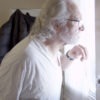Convincing a Jury of One
Written by Genevieve Butler | Posted by: Anonymous
At first it sounds hard to believe: students in a journalism course at Chicago’s Northwestern University managed to exonerate some convicts on death row in Illinois. They merely followed their stories and examined the cases, but the closer they looked the more it seemed that something was not right. The, albeit popular, system of capital punishment had failed, and people took notice. From the press to Illinois Governor George Ryan, the debate over capital punishment had moved to the forefront in the state in 2002. After some investigation by the Chicago Tribune and the various organizations devoted to the elimination of the death penalty, it was determined that over half the cases then on Illinois’ death-row (13 out of 25) were innocents.
Katy Chevigny and Kristen Johnson, co-directors of "Deadline," (Johnson was also the film’s cinematographer; Chevigny, a producer) had also worked together on "Innocent Until Proven Guilty," another documentary which investigates this country’s problematic justice system, the D.C. juvenile justice system, and have each a history of socially conscious filmmaking. Chevigny is also the co-founder of Big Mouth Productions of New York, which produced this and other social-issue documentaries, and maintains the website deadlinethemovie.com which contains a plethora of information about the issue of capital punishment (including recent posts about Massachusetts Governor Mitt Romney’s interest in restoring capital punishment to his state).
The film chronicles the time leading up to Governor Ryan’s landmark 2002 blanket commutation. Courtroom footage, interviews with the exonerated, their families, organizations for and against capital punishment, and victims’ families, reveal the miscarriages of justice that the system permitted, but also the devastation that those errors, like the crimes themselves, had left in their wake. It contextualizes the debate in history — the 1972 the US Supreme Court found capital punishment to be a violation of the 8th Amendment of the Constitution (cruel and unusual punishment), but the ban was short-lived, and capital punishment was resumed in 1977 — and showed that the Governor, a Republican in favor of the death penalty, truly agonized over the decision before him. He met with groups and legislators for and against capital punishment, and reviewed the cases, all the while aware that opposition to the death penalty was unpopular, a political Achilles’ heel belaying to some a softness of crime.
Like the file folders probably crossing the Governor’s desk at the time, the film shifts straight-forwardly from case to case, in a well-produced and highly articulate display of the multiple sides and situations, from Illinois to the whole country, and from over 30 years ago to the Clinton and Bush administrations. Lobbyists lobbied right up to the eve of Ryan’s decision. A petition arrived from all of the Illinois exonerated — captured in the film as a solemn but ambitions relay march from the state prison to the Governor’s office, in which one man said that "only through miracles did the truth emerge" bringing justice to the valley in which they walked — to a spokesman for the Governor. Ryan also met with victims’ families. As the time went on the media speculated one way then another, as the Governor himself said that his own heart went from pro to against as he deliberated.
At last in Illinois, for those against capital punishment and for those who were victimized by the obviously flawed system, the death penalty was a thing of the past. However, as the work of Big Mouth Productions and the Human Rights Watch Film Festival, and the ongoing national debate as captured in the film and now on its website makes clear, though indeed the battle was won in Illinois, the effort to end capital punishment in this country is a painful and ongoing one.
The film is critically acclaimed and an award-winner that first premiered at Sundance in 2004, and has since been run on NBC and screened nation-wide. It is an informative, articulate and masterfully made film.
‘Deadline’ will be screened at the Coolidge Corner Theatre’s video screening room at 12:30 PM and 6:00 PM n January 30, 2005, as part of the Human Rights Watch International Film Festival.
For more information visit: www.coolidge.org or www.hrw.org/iff and click ‘Boston.’
To find out more about 'Deadline' visit: www.deadlinethemovie.com. 'Deadline' will be screened at the Coolidge Corner Theatre’s video screening room at 12:30 PM and 6:00 PM n January 30, 2005, as part of the Human Rights Watch International Film Festival. For more information visit: www.coolidge.org or www.hrw.org/iff and click 'Boston.'











